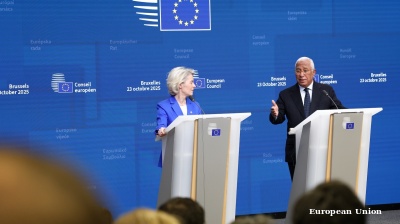Fears that Russia is on the edge of yet another financial crisis have sent the volume of repo deals soaring in August as banks scramble to build up cash buffers just in case.
The Central Bank of Russia (CBR) acted to calm the sector on August 29 by announcing it would take control of the troubled commercial lender Financial Corporate Otkritie by taking over a 75% stake. Otkritie has been wobbling for about two months now.
The CBR has already expanded the amount it makes available for repo deals — a form of short-term borrowing where banks can pledge securities against pricy short-term loans from the central bank — at least once this month.
The mechanism allows banks to balance their cash positions at the end of the trading day and is not designed to be a form of emergency financing. But repo deals are one of the most immediate ways a bank can get cash in times of crisis and they therefore become a de facto emergency loan facility.
Otkritie’s woes have unsettled the market. bne IntelliNews reported on August 11 that the bank was “in trouble” and the bank’s ATMs stopped working the next day. Market players told bne that they have been cutting exposure to the bank in a move reminiscent of the 2004 banking mini-crisis. That year, the CBR pulled the bank license of the aptly named Sodbiznes bank for money laundering and stealing deposits – the first time it had ever cancelled a bank license.
Rumours of a CBR “black list” of other bank licenses that were about to be pulled caused the interbank market to seize up and precipitated a real banking crisis that saw Guta Bank, a major commercial bank, go to the wall.
The 2008 collapse of Lehman Brothers lead to one bank failing in Russia, Kit Finance, but that was rescued by state-owned Russian Railways (RZD) by lunchtime the same day.
However, Russian bankers have become battle hardened and are now less likely to panic than they were back then.
The central bank has also acted decisively in this crisis with its decision to take direct control of Otkritie, the first systemically important bank to need a bailout. Rather than just lend the bank money (the CBR made one unsecured loan to Otrikite earlier this month) the central bank has put itself in the unorthodox position of actually becoming the owner of the bank, resulting in the weird situation where the regulator is also a market participant.
However, this plan has the advantage of dodging the need for a moratorium on the repayment of the bank’s credits or a bailout of depositors using the Deposit Insurance Agency (DIA). The idea is that backed by the most solid investor a bank can possibility have Otkritie’s doors remain open and it is business as usual.
This solution stands in stark contrast to the collapse of PrivatBank in Ukraine in December last year where the National Bank of Ukraine (NBU) has been left to pump in billions of dollars to fill a $5bn hole in the bank’s balance sheet. The CBR’s plan is probably by far the cheapest option available.
Nevertheless, the Otkritie takeover has left the Russian financial community nervous as evidenced by the soaring repo deals, and the CBR has also promised to make more cash available for the sector, without being specific.
However, the Russian central bank is really good at dealing with crises. In 2008 the CBR called all the heads of the largest banks in for a meeting and calmed collective nerves with promises of support. As Russia moves through each of these financial crises its creditability is only improved, which allows cashless solutions to wobbles in confidence.
News
_1761305900.jpg)
Latin America edges up growth forecasts but remains trapped in low gear, ECLAC says
Latin America and the Caribbean will expand 2.4% this year, the Economic Commission for Latin America and the Caribbean said, marking the second upward revision since April but pointing to the region's struggle to escape chronically weak growth.

Palestinian ambassador pledges Iraqi embassy in Jerusalem
Palestinian ambassador pledges to open Iraqi embassy in Jerusalem as Iraq lays foundation stone for Palestinian ambassador's residence in Baghdad's new diplomatic quarter covering 300 hectares.

EU pledges ongoing support for Ukraine, defers decision on Russian assets
European Union leaders pledged continued financial backing for Ukraine over the next two years, but delayed a decision on tapping billions of euros in frozen Russian assets to fund Kyiv’s defence

Trump Administration striving to strike critical minerals deal with Kazakhstan
Pushing for US firm to win rights to develop major tungsten deposits.

 Cropped.png)


